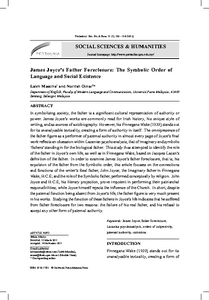Citation
Massiha, Laleh and Omar, Noritah
(2013)
James Joyce’s father foreclosure: the symbolic order of language and social existence.
Pertanika Journal of Social Sciences & Humanities, 21 (1).
pp. 203-216.
ISSN 0128-7702; ESSN: 2231-8534
Abstract
In symbolising society, the father is a significant cultural representation of authority or power. James Joyce’s works are commonly read for Irish history, his unique style of writing, and as sources of autobiography. However, his Finnegans Wake (1939) stands out for its unanalysable textuality, creating a form of authority in itself. The omnipresence of the father figure as a performer of paternal authority in almost every page of Joyce’s final work reflects an obsession within Lacanian psychoanalysis, that of imaginary and symbolic ‘fathers’ standing in for the biological father. This study thus attempted to identify the role of the father in Joyce’s own life, as well as in Finnegans Wake, based on Jacques Lacan’s definition of the father. In order to examine James Joyce’s father foreclosure, that is, his expulsion of the father from the Symbolic order, this article focuses on the connections and functions of the writer’s Real father, John Joyce; the Imaginary father in Finnegans Wake, H.C.E; and the role of the Symbolic father, performed conceptually by religion. John Joyce and H.C.E, his literary projection, prove impotent in performing their patriarchal responsibilities; while Joyce himself rejects the influence of the Church. In short, despite the paternal function being absent from Joyce’s life, the father figure is very much present in his works. Studying the function of these fathers in Joyce’s life indicates that he suffered from father foreclosure for two reasons: the failure of his real father, and his refusal to accept any other form of paternal authority.
Download File
![[img]](http://psasir.upm.edu.my/40642/1.hassmallThumbnailVersion/James%20Joyce%E2%80%99s%20father%20foreclosure%20the%20symbolic%20order%20of%20language%20and%20social%20existence.pdf)  Preview |
|
PDF
James Joyce’s father foreclosure the symbolic order of language and social existence.pdf
Download (344kB)
| Preview
|
|
Additional Metadata
Actions (login required)
 |
View Item |

